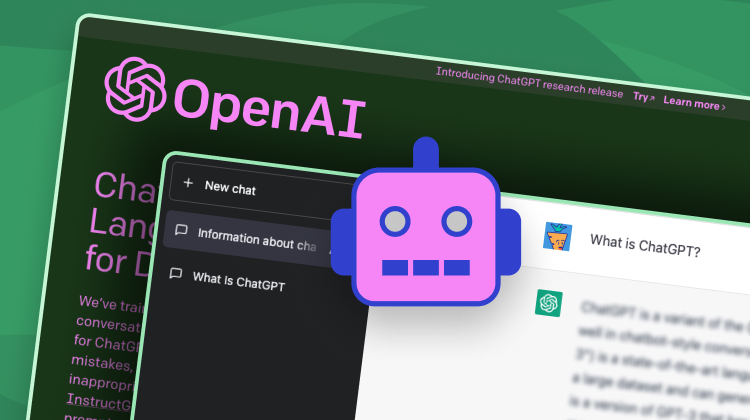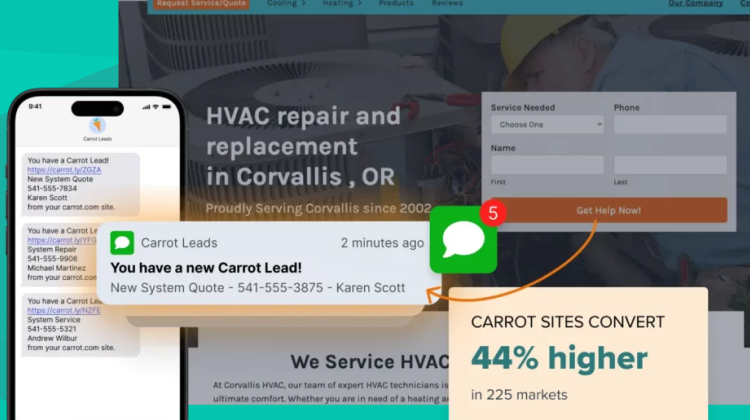
We’re all familiar with search engines and how they help us find information quickly and easily. But, with the emergence of artificial intelligence (AI), could search engines be replaced altogether? Let’s take a look at how ChatGPT for real estate is changing the way people find information online.
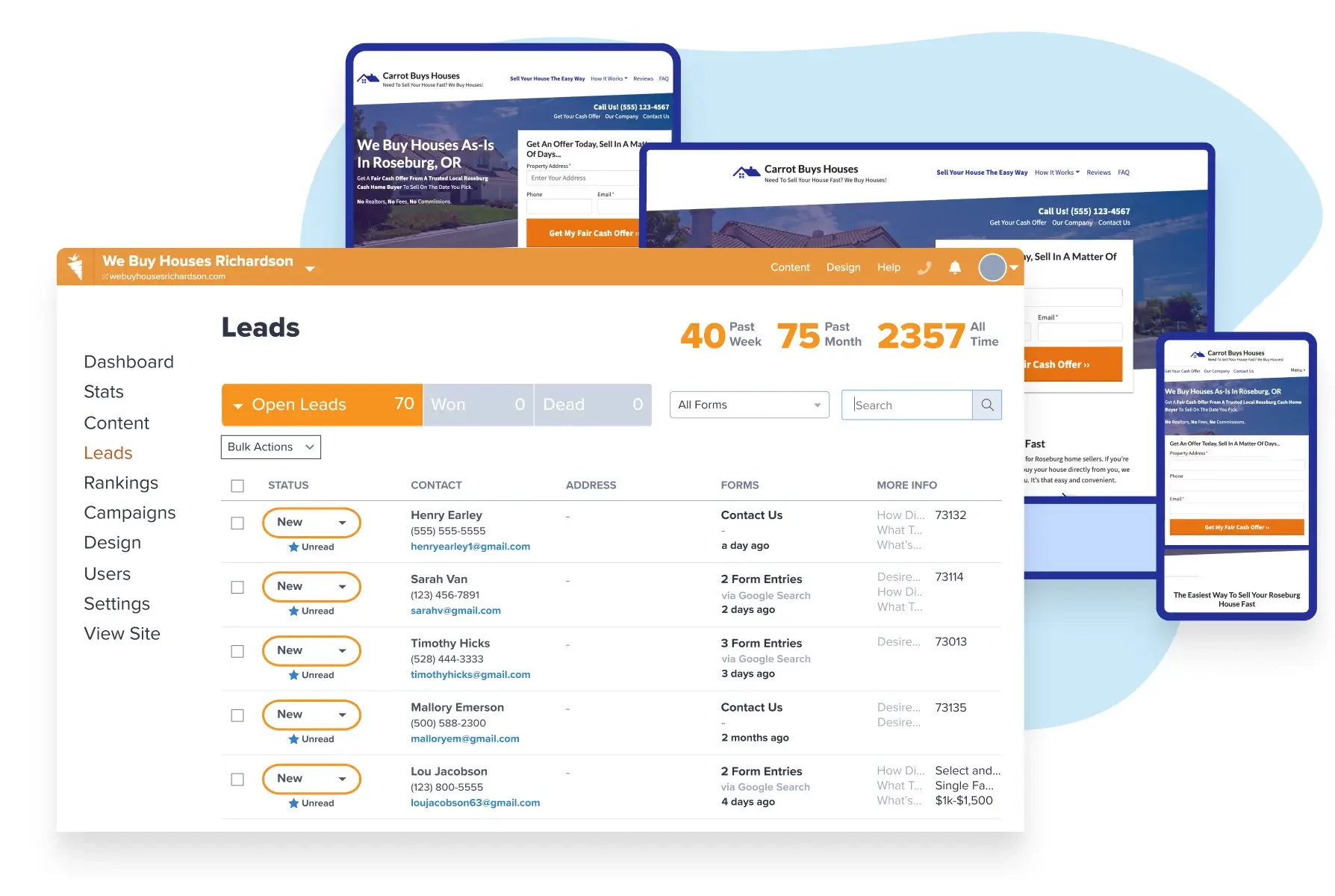
Demo Carrot: How many deals are you losing to your competitor’s website?
Take a Free DemoWhat is ChatGPT for Real Estate and How Does it Work?
ChatGPT stands for Conversation Graph Technology, an open-source natural language processing (NLP) model that enables users to create conversations with computers. It uses deep learning and predictive text to generate responses to a user’s questions or statements.
By leveraging the latest advances in AI, ChatGPT is capable of understanding and responding to complex conversations in real-time. Unlike other NLP models, ChatGPT does not require pre-trained data sets and can be trained on any domain-specific data set. This makes it ideal for applications such as customer service, virtual assistant development, and conversational marketing campaigns.
Additionally, its accuracy, scalability, and low latency make it suitable for enterprise applications. With its cutting-edge technology, ChatGPT has the potential to revolutionize how people interact with computers by making conversations more natural and engaging than ever before.
Those 3 paragraphs were written entirely by asking an AI “What is ChatGPT?” – Pretty neat, right?

AI is Changing the Way We Find Information Online
Artificial Intelligence is transforming how we interact with technology, and it’s having a major impact on search engines. In fact, AI-powered chatbots are already beginning to replace traditional search engine queries.
As technology advances, the role of the AI chatbot in providing personalized and instantaneous responses to user inquiries continues to grow, revolutionizing the way people seek and obtain information online.
For example, when you ask Siri or Alexa for something specific—like “What’s the weather like for today?”—they will provide you with an answer without having to type in any keywords or phrases. This is because AI-powered chatbots can understand natural language processing (NLP). This means that they can interpret human speech and respond accordingly. Moreover, with the emerging rise of Large language models (LLMs) it’s becoming easier to deal with content and leverage data for further advancements.
Can ChatGPT or Other AI Change How We Make Content?
Yes, it absolutely can. There are already hundreds of websites out there that are written entirely by AI language models! Theoretically, you could use AI to create 100% of your content – but is that a good idea? Are there any SEO implications for doing something like that?
Deciding whether or not to use AI to create content for your business is a tricky question that requires careful consideration.
On the one hand, using AI-generated content could save time and money. On the other hand, Google may flag such content as spammy, which could hurt your business’s SEO rankings and brand impression (more context on this later in the article).
When considering whether or not to use AI-generated content for your business, it’s important to remember that Google’s algorithms are constantly changing and improving. As such, certain tactics used to generate content with AI may become less effective over time or even completely outdated.
While AI can automate many tasks associated with content development—such as finding relevant topics and keywords—it cannot replace human feedback, creativity, and insight when it comes to crafting unique pieces of content that are engaging and helpful to readers.
Furthermore, any automated content created by AI should always be checked for accuracy and clarity by a human editor before publishing. Although AI may generate accurate results based on complex data, understanding how those results apply to real-world applications requires expertise and human feedback to interpret the results properly.
Although, in case of bulk content, you can even use a specialized online proofreading tool (Wordvice AI is a good one to use).
This ensures that any automated content published on behalf of your business is free from errors, complies with regulations (if applicable), and meets all standards for quality control in terms of grammar, style, formatting, etc.
In short – yes, you may consider using ChatGPT for Real Estate to create content for your business IF you’re confident that you understand its limitations and capabilities. When appropriately used—combining human creativity with machine automation—AI-generated content can provide great benefits in terms of efficiency and cost saving without sacrificing quality or accuracy.
Just make sure to monitor how Google flags such material, so you don’t fall behind with its algorithm changes!

How will ChatGPT impact SEO in the future?
While it might seem like ChatGPT and other AI learning models are poised to kill search engines like Google and Bing, it will be a long time before search engines are replaced. Chatbots aren’t new, but they aren’t out of beta either. Most AI models are several iterations away from being able to compete with search engine powerhouses.
There are several reasons for this:
- AI and Chatbots are inherently biased. The answers are based on human-made data currently available online. That means racism, bias and misinformation can bleed into a chatbot’s learning model, giving unsavory answers and unsafe content.
It’s why Microsoft had to hastily take its AI chatbot offline in 2016, shortly after it was introduced. Facebook also introduced a chatbot, but after reviewing user feedback they quickly took it down after giving racist answers. - ChatGPT can confidently present the wrong answers. These answers are generated using language models found online, but that creates problematic model outputs – mainly in the form of incorrect answers. ChatGPT must collect user feedback at a large scale before it can reliably provide the correct answer.
- It’s cost prohibitive. The processing required to deliver an acceptable tuned answer by scrubbing immensely large pools of data is expensive. One estimate has OpenAI spending $3 million per month, with ChatGPT still in beta, requiring people to make an account.
- High traffic means frequent server downtime. While writing this article, we tested ChatGPT once an hour for 3 hours. Unfortunately, the servers were at capacity each time we checked. Could you imagine a world where Google servers were at capacity?
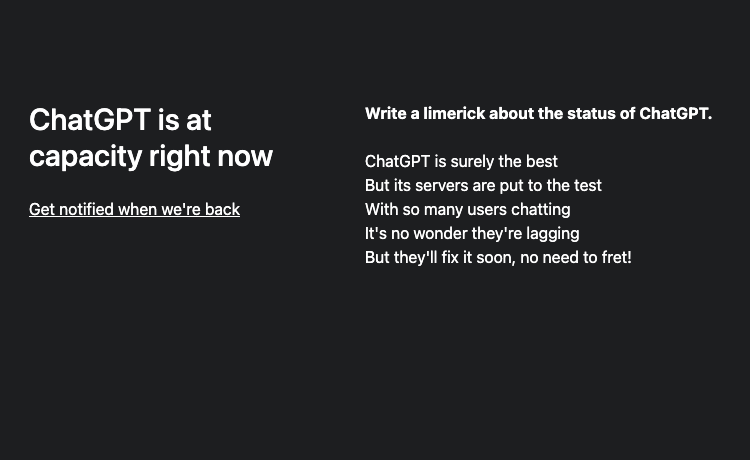
Is Google Moving Against AI & ChatGPT?
Absolutely. We have already seen some action from Google to combat the inevitable flood of AI content on the internet. The Helpful Content Update, the Spam Link Update, and the Product Reviews update all had a heavy impact on AI-generated content (among other things).
However, Google has also invested heavily into its own AI, LaMDA, which went viral last year for being “sentient.” Their controversial handling of testing LaMDA shows us how cautious and powerful Google considers AI to be.
For the moment, Google continues to rely heavily on Google Search, which makes money through ads and e-commerce sales and accounted for nearly 80% of its revenue last quarter.
Google CEO Sundar Pichai has been in meetings to “define Google’s AI strategy” and has “upended the work of numerous groups inside the company to respond to the threat that ChatGPT poses.”
Will AI be Integrated into Search Engines or Replace them?
Microsoft recently announced this week that they are incorporating ChatGPT into the Bing search engine in hopes of winning users from Google.
Microsoft has already invested over $1 billion into OpenAI. It has hopes that becoming a bigger player in online search could help offset its problems elsewhere (like its slowing growth in cloud computing).
Bing’s ChatGPT integration could launch as soon as late March, according to a report by The Information.
The Benefits of AI-Powered Search Engines
Using an AI-powered search engine has numerous benefits over traditional search engines. For one thing, since AI-powered chatbots can interpret natural language, users don’t have to worry about typing in exact keywords or phrases in order to get relevant results. Instead, they can ask their question in plain English and get an answer immediately.
Traditional search engines rely on algorithms to understand the content of websites, while AI-enabled search engines can better comprehend and interpret human language. As a result, they can provide more accurate results than traditional methods that tend to be limited by keyword matching.
AI-enabled search engines can also understand various types of queries, from single words to complex sentences, making them more versatile and reliable when interpreting what users are looking for.
AI can learn from user behavior and preferences. This means that AI-enabled search engines can improve their relevance rankings based on past searches and personalization options.
Additionally, machine learning allows them to identify patterns in data and make predictions accordingly, which makes them suitable for more complicated tasks such as providing detailed answers to queries or suggesting new topics or related content. This is something that can’t be done with conventional search engine algorithms very easily. This is one of Google’s primary concerns.
Since machine learning algorithms power chatbots, they can provide faster answers than traditional search engines- especially for simple queries. Sometimes people want the answer to a question without needing to scrub through 10 results and a slew of ads.
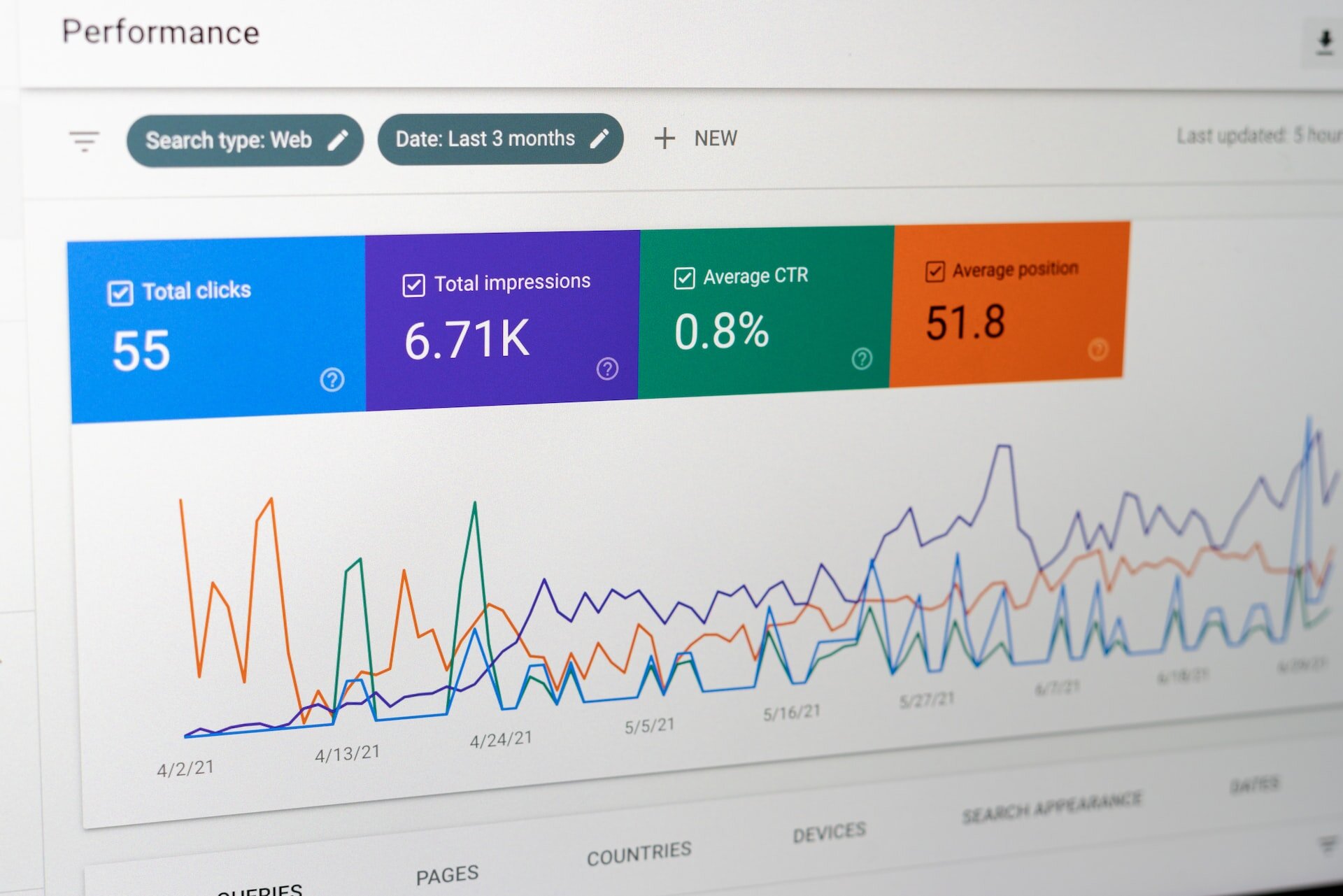
Are there any risks associated with using ChatGPT for Real Estate SEO purposes?
Yes, there are some potential risks associated with using ChatGPT for real estate SEO purposes. Although the technology is AI-based and can generate content easily, it may not always provide the level of accuracy or relevancy required for SEO purposes. This can lead to a decrease in quality when creating content that is both optimized and engaging.
Due to its automated nature, ChatGPT will also struggle to keep up with changes in search engine algorithms or topics related to SEO that require special attention.
Moreover, it is important to note that since the generated content will likely be similar across multiple websites, it can lead to duplicate content issues which could negatively impact the rankings of all involved sites.
This could result in penalties from search engines or even blacklisting if not appropriately addressed. Additionally, ChatGPT has no capability of understanding how humans use language differently based on cultural context and, as such, might not be suitable for certain markets where this kind of sensitivity is required.
Finally, many experts have warned about over-relying on automated solutions, like ChatGPT for real estate, as they might create content that looks good but lacks meaningful relevance or fails to engage readers in a meaningful way effectively.
Should I Use AI Content Generation for My Real Estate Investor Website?
You should be very cautious with this. Google has already shown off its ability to detect AI-generated content, and the consequence is having your blog post removed from the Google Index.
However, there are a lot of powerful applications where using AI can benefit your company. Generally speaking, you want to use AI to outline our content or give us a starting point from which we can edit.
AI can do 80% of the work, but to fly under the radar and avoid Google penalties, you still need to edit/refine the last 20%. Some examples of tasks that AI can do safely:
- Blog post outlines
- Title variations
- Meta descriptions
- Conclusion paragraphs
- Ad copy
- Intro paragraphs
- Product descriptions
Please keep in mind that the more unique, helpful, and original content that you can create – the better off you will be.
The Human Touch: Why AI-Generated Content Needs Human Editing to Shine
At this point, it seems unlikely that traditional search engines will be completely replaced by AI anytime soon; however, it’s clear that AI will continue to have an increasingly important role in finding information online.
ChatGPT for real estate can save time and improve efficiency by quickly generating ideas and keywords for your blog, but it lacks the creativity, nuance, and personal touch that only humans can provide.
As real estate investors continue to leverage technology for success in their businesses, understanding how AI works and how it impacts search engine usage will be key to staying competitive in today’s market!
If you want to stay ahead of the curve in all things SEO, be sure to bookmark our Real Estate SEO page to get access to all of our in-depth SEO articles and guides!

